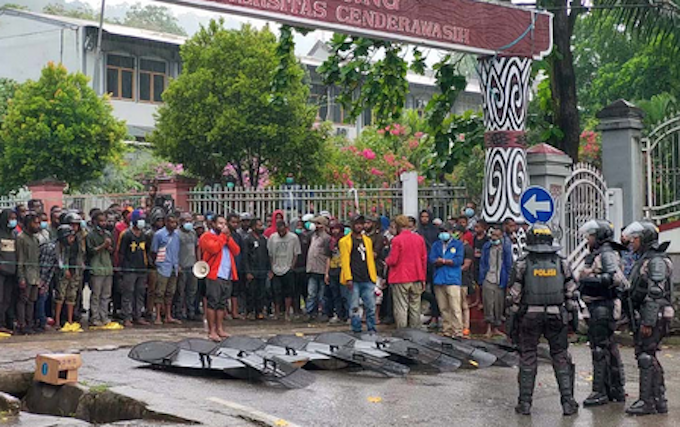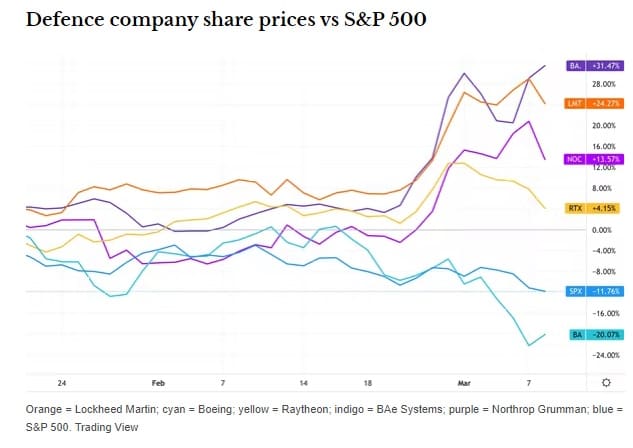COMMENTARY: By Gavin Ellis
Atrocities and total war are not pixilated or sanitised. They bring death with unimaginable brutality and obliterate lives with indifference. It is time to stop protecting the New Zealand public from these grim realities of Vladimir Putin’s invasion of Ukraine.
Our news media post warnings about disturbing images and then obscure them out of a long-held regard for the sensibilities of readers and viewers over portrayal of death. We see shapeless body bags while those lying in the street are given a dignified digital shroud.
Yes, we read and hear descriptions of what the innocent citizens of Ukraine have had to endure at the hands of Russian invaders. However, we are shielded from most graphic detail of what is being done in a mission to “demilitarise and de-Nazify” a democratic nation that posed no defence threat to its neighbour.
How often do we see and hear the phrase “Warning: The following item includes disturbing images including dead bodies” when, in fact, we are left to imagine what the body looks like under its obscuring mantle?
I was moved to think about New Zealand media depiction of the victims of war crimes in Ukraine by an essay that appeared in The New York Times last Saturday. Written by long-time photojournalist David Hume Kennerly, it was headed “Photographing Hell”.
Kennerly was a combat photographer in Vietnam and was responsible for the iconic image of a vat of cyanide-laced Flavor Aid surrounded by corpses in the 1978 Jonestown massacre in Guyana. He is no stranger to war and death and was reminded of Jonestown when he saw images of the bodies of civilians lying in the street when Bucha, on the northern outskirts of Kyiv, was retaken by Ukrainian forces.
Those images were denounced by the Kremlin as “fakes” and “provocations”, to which Kennerly responded: “The images of these atrocities were taken by trusted photojournalists. They are the truth, and a record of the mendacity and brutality of the Russian military. As accusations of war crimes mount, these photos are the documentation the world needs to finally understand what is really happening in Ukraine.”
‘Direct line to people’
He went on to describe photographs as “a direct line to people, over the heads of officials, pundits and disinformation” and said some photographs will always have the power to make us confront horror.
One of the images accompanying his essay had that effect on me. It was a photograph of a body bag. It had been unzipped far enough to reveal the side of a face staring resolutely ahead. In death, the man was telling us he was an eye-witness to the atrocity that had taken his life.
The photograph had been taken by Carol Guzy, a four-time Pulitzer Prize winner, who covered the conflicts in Kosova and ISIS-held Mosul. Her photographs taken following the liberation of Bucha are confronting and include bodies being exhumed from mass graves, charred corpses, and open caskets. Yet somehow it is the unseeing eye peering from a body bag that is truly iconic.
Kennerly’s essay recalls similarly iconic images from his time in Vietnam, such as Eddie Adams’ picture of a Vietcong suspect being executed in a Saigon street and Nick Ut’s image of a young girl running naked down a road after being burnt by napalm. They helped to change public attitudes to that war.
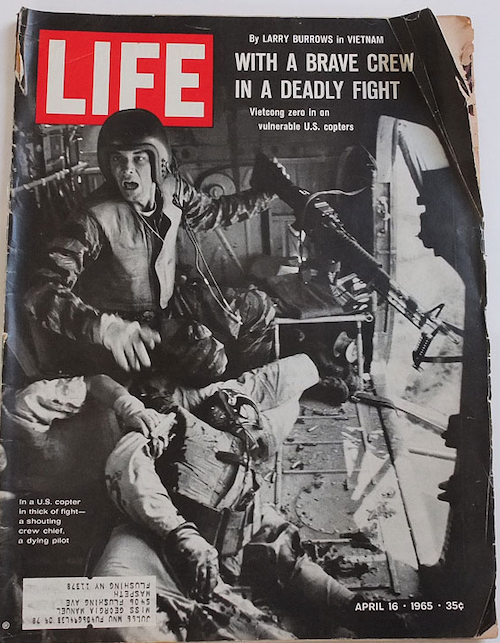
He could have added Ronald Haeberle’s photograph of a pile of bodies, victims of the My Lai massacre by American soldiers, that appeared on the front page of the Cleveland Plain Dealer and forced the U.S. military to confront its own crimes. And Malcolm Browne’s photograph of a Buddhist monk in the act of self-immolation in Saigon shook the United States and elsewhere. And Larry Burrows’ Life magazine cover story showing a helicopter gunner with a dying pilot at his feet.
Or he could have gone back further. Start with Goya’s depictions of the Peninsular War between 1810 and 1820, then move to Robert Capa’s moment-of-death image of a falling soldier in the Spanish Civil War in 1936, and Margaret Bourke-White’s graphic portrayal of the liberation of Buchenwald concentration camp that appeared in Life magazine in May 1945. Our understanding of those events is rooted in what we were shown more than what we were told. As Kennerly observes in the essay: “Evocative images can affect policy, spur action, and every now and then alter the course of history”.
indelibly on the public record
Now we have Ukraine and Kennerly says many of the photographs from that war deserve to live as indelibly on the public record as the photos of Vietnam (and elsewhere).
But will they achieve that status if news media sanitise and, yes, censor them?
Kennerly ends by saying he’s getting tired of endless disclaimers (there is one at the top of his New York Timescontribution) that warn of “Graphic Material”.
“The best photographs of war might make us want to look away. It’s imperative that we do not.”
I agree, but I concede there is a strong tradition in this country (and in many other places) of shielding audiences from the visual depiction of death. I cannot recall, for example, seeing an unobscured image of the face of a dead person in our media, unless from a safe distance.
I certainly don’t recall publishing one during my editorship of The New Zealand Herald although I certainly saw many confronting images. News agencies observed the practice of sending the image and expecting editors to decide whether or not to publish it.
Jessica Fishman, in a very good US study of how the media censor and display the dead entitled Death Makes the News,notes that news organisations make a distinction between writing about death and portraying it visually. Much of her book is devoted to explaining why images are not published, including the dangers of “death pornography”.
Exceptions made by media
However, she identifies exceptions that media make. More often than not those exceptions are made for bodies somewhere else. Too often they are images of people “who don’t look like us”. Those are poor reasons for publication.
There are some good reasons for being extremely circumspect about publishing images from within your own country when there is a strong likelihood they will be seen by grieving relatives and friends. This is the principal reason New Zealand media do not publish pictures of bodies in fatal road crashes. It was one of the compelling judgements made by New Zealand media following the Christchurch mosque massacre when coverage concentrated on survivors.
Inevitably, however, there will be exceptions to this domestic reticence. For example, in 1972 the Daily Mirror in Britain ran a front page picture of a priest administering last rights to a protester, one of 13 killed by British troops in the Bloody Sunday incident. It is a picture I, too, would have published because it bore witness to demonstrably disproportionate use of state force.
Similarly, I would have published a photograph carried on the front page of The New York Times in 2013. It wasn’t local. It documented a war crime.
The image was of a row of bodies, four of them children, in white shrouds with only their faces visible. They were the victims of a Syrian chemical attack in Damascus.
The paper’s public editor Margaret Sullivan, in a column explaining the decision to publish, invoked the images from Vietnam that Kennerly is now resurrecting. She said they brought home the horror in a way that words never could, and the image from Syria was similarly “capable of changing the narrative, possibly affecting the course of history”. Tragically, that picture has not.
Now we have Ukraine and the strong likelihood that images captured by photojournalists in the war zone will contribute to mounting evidence of war crimes. There are precedents: Photographs taken by Ron Haviv in Bosnia played a material part in the conviction of Slobodan Milošević, Radovan Karadžić and a local warlord by the International War Crimes Tribunal at the Hague.
Images add to outrage
New Zealand publication and broadcast of explicit images of war crimes against Ukraine will not tip the balance of history or convict war criminals. However, as elsewhere, a New Zealand audience’s exposure to them will add to the weight of international public opinion against the perpetrators. Images will add to outrage.
Equally, or perhaps of even greater importance, verified explicit images of war crimes and victims may help to counter Russian propaganda still being freely disseminated in this country through the Daily Telegraph New Zealand website (no connection to the publications of the same name in London and Sydney). It carries, unquestioningly, both RT and Sputnik “news” services.
This is not to say that New Zealand media should declare open season on publishing pictures of the dead. Far from it. We are the better for not being exposed to recurring death pornography.
There are also limits to what the public can be expected the bear. In 1991, for example, Associated Press pulled from the wire an image of the charred corpse of an Iraqi soldier who had failed to escape from a burning truck on the Gulf War’s Highway of Death. One picture editor called it “the stuff of nightmares”. London’s Observer was one of only a handful of papers that ran it — and repeated publication in a book on the war. I vividly recall the image. Would I have inflicted it on a New Zealand audience? No.
Decisions on whether to publish defining images that capture far more than a moment are hard when the central focus is a corpse. It requires not only a determination of newsworthiness but also a self-examination of motives. Publication must serve a higher purpose than merely shocking an audience.
Sadly, pictures that serve that higher purpose will continue to emerge from Ukraine. I hope editors in this country publish them. They were paid for with the lives of innocents.
Dr Gavin Ellis holds a PhD in political studies. He is a media consultant and researcher. A former editor-in-chief of The New Zealand Herald, he has a background in journalism and communications – covering both editorial and management roles – that spans more than half a century. Dr Ellis publishes a blog called Knightly Views where this commentary was first published and it is republished by Asia Pacific Report with permission.
This post was originally published on Asia Pacific Report.
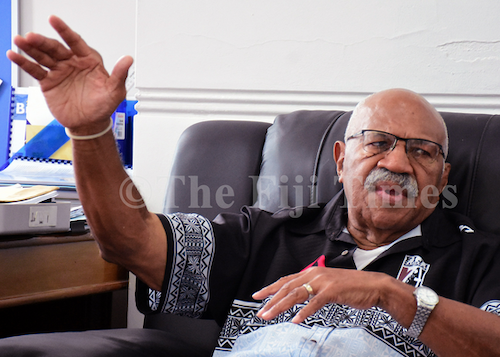
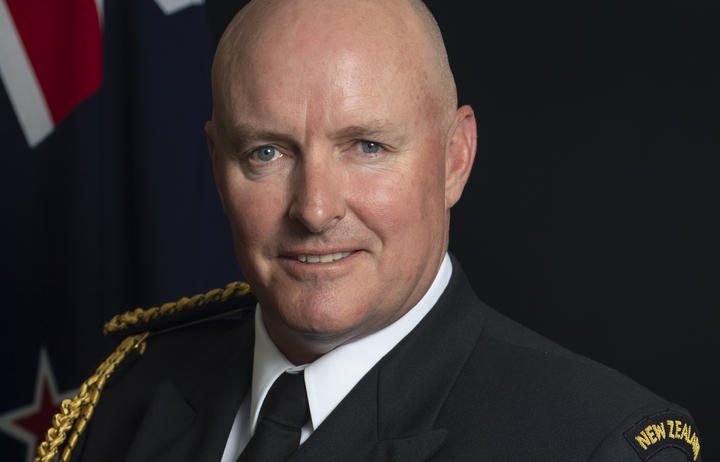
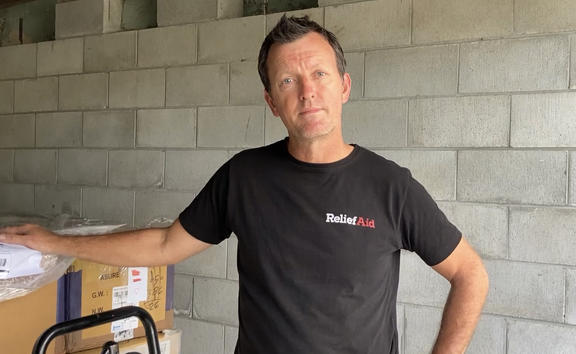
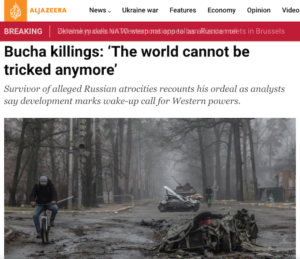
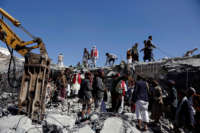

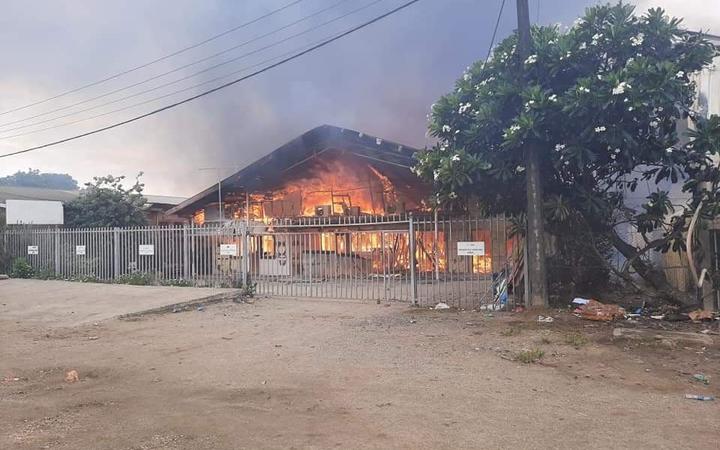
 (@YourAnonTV)
(@YourAnonTV)  VICTORIA GARVEY
VICTORIA GARVEY

 Russian invaders fire at a civilian car with passengers inside! This is evidence for the Hague.
Russian invaders fire at a civilian car with passengers inside! This is evidence for the Hague.
 (@DefenceHQ)
(@DefenceHQ) 